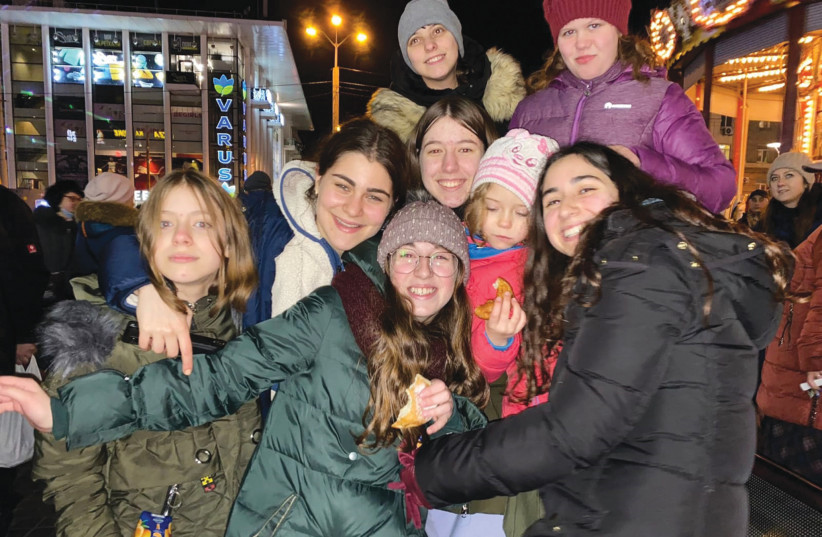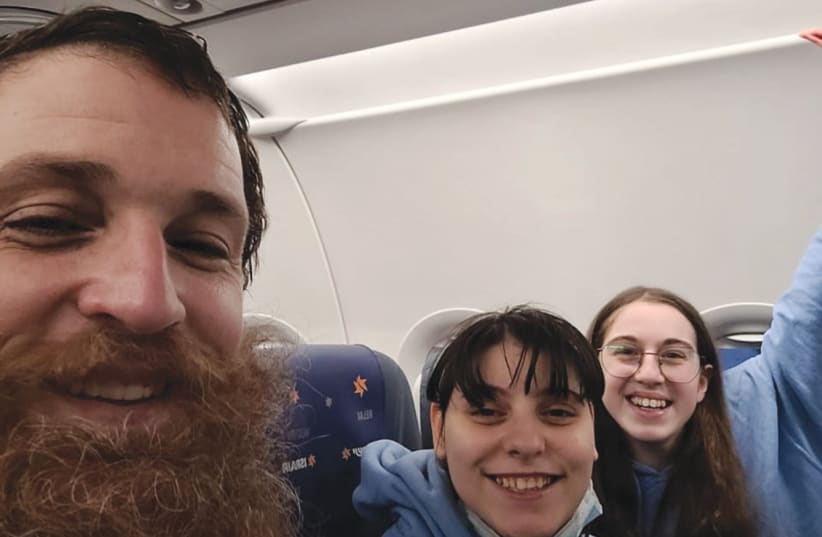Kharkiv, Berdychiv and Kyiv are cities I have known in my mind since my childhood, through stories told to us from our grandparents – stories of survival in the cold winters, when practicing Judaism was dangerous, stories of famous rabbis and tzadiks in Russia and Ukraine.
Anatevka has always been for me the little village where Chaim Topol talks to God about his daughters as the Russians were coming to burn it down in Fiddler on the Roof.
To see the town of Anatevka on Fox News Live with its citizens talking about the war feels so unreal.
Oh, so Anatevka really exists; I thought it was a Hollywood name...
My great-great-grandfather was the chief rabbi of Kharkiv, Rabbi Aron Tumarkin; I stare at the picture my cousin sent me. Suddenly our past becomes so significant.


The truth is that Ukraine became much more of a reality for me when my good friend Sora Doba from England married Yossi Glick almost 20 years ago. A lovely boy from Australia, they moved on shlichut (outreach abroad) to Dnepropetrovsk (now renamed Dnipro), Ukraine, to run a Chabad orphanage for Jewish children, the Esther and William Benenson Home.
Sora Doba comes from Chabad royalty. Her grandfather was the famed Rabbi Mendel Futerfas.
Futerfas operated secret heders (Jewish boys schools) in the USSR. After being caught, he was sent to the Gulag for eight years. After leaving Russia, Lubavitcher Rebbe Menachem Mendel Schneerson told him to serve as a mashpia (spiritual adviser) at the Yeshiva of Tomchei Temimim in Israel’s Kfar Chabad, a role he took up in 1973.
It must have been incredible for Sora to return to her roots once married and establish her family there in Ukraine.
We spoke when we could by phone and she often invited me to come and see for myself what an amazing city Dnipro has become, with an incredible Jewish hub known as the Menorah Center, one of the biggest Chabad buildings in the world. Plus, of course, to see their orphanage, to which they dedicate all their time and love.
Little did I know that these past weeks I would be writing to her every hour in the middle of the night, when she finally wrote to me, “We are on a train trying to make it to the border.”
IT WAS 1 a.m. on Tuesday, March 1.
I am in a beautiful hotel in Israel for a short getaway with my husband. She’s on a train with four out of her seven children (the others are already in New York).
It can’t be real, I think to myself, I must be dreaming.
It’s not safe for us anymore here, she writes via WhatsApp, they have evacuated women and children and put us on trains toward the border to get us out of Ukraine in any way possible.
We wrote to each other throughout the night. I tried to make her laugh with stories of how we met when we were in school in London together. She laughed so as not to cry.
By 5 a.m., I can barely keep my eyes open while her WhatsApp status remains “online.” She didn’t sleep for a second, she told me. They had the luxury of a compartment for themselves with tiny beds in what looked like a train from the ’60s. She also said she was lucky because her kids were already older, her youngest 10, while other families there had small babies who cried and needed feeding and diapers throughout the night.
It’s 2022, right, not 1940? I check my phone again, making sure this is actually happening.
We spoke again when they had crossed the border from Odessa and made their way to Romania, destination Bucharest, on a bus for another 20-hour drive. I feel bad about enjoying my fresh croissant and hot cappuccino in the hotel’s breakfast room knowing she needed a simple shower and desperately wanted to speak with her husband, Yossi, who had stayed behind in Dnipro.
I don’t want to ask too many questions, I don’t want to say the wrong word. I just let her speak when she feels she needs to, although she’s a woman of few words and more actions.
FINALLY, AFTER almost 20 hours I receive a video call. It was her. She looks fresh and was smiling at me. I stare into the camera and try to notice every detail.
She’s in a hotel in Bucharest. She has slept and changed her clothes. They will be boarding a flight to New York the day after. I shed tears. She tells me she has stopped crying.
Her parents are waiting for her in America, along with her sister and her other children (the older ones). She still looks like the girl I met in school; we always told her she looks like a Russian doll, with black hair, deep brown eyes and porcelain skin.
I am so happy for her although I hear no updates on her husband. I know he stayed behind with the children of their orphanage, so I don’t ask.
A few hours later, I receive a message from her – Yossi is on the way to Lviv to try to cross the border with Moldova. He is with two young women from the orphanage. From there he will try to make it to a city nearby and then catch a flight to Israel.
Israel, I scream, so he is coming here! Okay, what do I do now, I ask her; I’ll be in touch, she writes.
A few minutes later I receive a call from Sora’s sister who lives in New York telling me that they’re trying to arrange a hotel for Yossi in Jerusalem for Shabbat and if he can eat with us.
He can come to stay here, eat here, whatever he wants! I reply.
We will let you know, she says.
Suddenly my Shabbat preparations take a whole new meaning. I tell my girls we have to make the best food ever. I instruct my husband to buy lots of wine and cakes. We are going to have a party this Shabbat, like we always do, but this time a little more.


The two girls coming to our home are 15 and 21. I tell my younger kids a story before bed about our special guests who will be coming over, as my two older girls are for the first time listening by the door of the room.
I open the door at 1:45 p.m. on Shabbat day and Yossi is standing in full Shabbat dress with his kapote (a long coat worn by hassidim on Shabbat), smiling at me and saying Gut Shabbes.
I CANNOT believe it. I can hardly answer him back. I just stare at him. The last time I saw him must have been 20 years ago when they had just gotten married.
He looks older but still young in a way, his beard is still reddish brown. He walks into my house and looks around, probably not believing himself that he is here.
“How are you” would sound a bit stupid, I think, as he sits on a couch and just smiles back.
It was a long trip, he sighs. We managed to board a train to Lviv, he says, by then when I left with the girls there were no more tickets. You just went to the station and tried to get on any train going toward the border. You can imagine what was going on. My compartment was made for four people, we were 12.
I need to sit down.
So you basically stood for 17 hours?
Yossi smiles and continues his story: It was a dark, nearly silent train ride. I managed to sneak out of the compartment for a few hours. I found a place standing between the wagons, but it was very cold; somehow the woman in charge of that wagon, who shovels coal to keep it warm, noticed me and made a little space where she was. It was full of suitcases but I managed to sit on one of them.
Did you get to go to the bathroom?
Once, he says, but people crowded in the area were upset I had woken them up, so just that one time.
It’s all surreal.
The miracle in all this craziness is that now being a Jewish refugee is what actually saved us, Yossi continues. During the last world war you had to hide your identity. Now all refugees are trying to get a Jewish identity. Because if you are Jewish, someone across the border will take care of you and put you on some flight directed somewhere in the world.
Between the Israeli embassies, Chabad organizations and Jewish organizations all across the world, Jewish refugees are the privileged ones – the ones who get to cut the lines, the ones who get a warm meal, a fresh bed and a hug all over the world until they make it to their new destinations.
There is always a silver lining to every story.
This time for the Jews the story is different.
THERE IS some sad light in his eyes though I will not ask, “What is going to happen?” Your house, the orphanage, years of work and love are all left behind for now. But now we are staying positive.
Yossi tells us how scary it was on the train as they approached every station in Ukraine. They were shutting all the lights and were asked not to utter a sound in an over-packed train full of kids. At the many stations they stopped at on the way to the border, when the doors would open, adults were trying desperately to get on with their children, but there was no room. So they would try to shove their kids and babies onto the train so at least they could be brought over the border.
Our guests start coming in from the synagogue. My husband greets Yossi with a warm embrace as if they knew each other for a long time – we are all connected to each other.
The two young ladies from the orphanage have also arrived. The older one (21-year-old Risha) looks younger and more scared than the younger one (15-year-old Aviva). They speak English and Hebrew. We didn’t want to ask too many questions about their story, although I know that in their orphanage in Ukraine, Yossi and Sora Doba deal with all kinds of situations and tough stories of girls from all different backgrounds – from not having a parent to being taken out of a dangerous family situation, being abandoned, being sick or dealing with poverty.
The two girls sit by the table with my girls and some of their friends. We are all staring at them in awe. As we start bringing the food to the table I keep checking on them and making sure they eat. I feel like I just want to see them eat and laugh and forget where they are, or where they were, or where they want to be.
Aviva is a sweetheart; she keeps on thanking me with her heavy accent. I feel like I want to hug her. We eat, we laugh and then we make a l’chaim and ask Yossi, our guest of honor, to say a few words, a dvar Torah.
Yossi smiles and starts right away with a positive vibe. Instead of sighing and telling us how brave and heroic they are, he immediately connects the main points of the weekly parasha, Pekudei, to the actual situation in the world and what we can learn from it.
The strength of the Jews, I think to myself. Just look at him – he just left everything behind in Ukraine, his home, his job, not knowing when he will see it again. He still needs to reunite with his family, who are now in America, yet he is here giving us words of truth and strength!
Yossi goes on to tell us how the real heroes in this war are the shluchim (emissaries) who are still left behind working night and day with those who didn’t manage to escape and are left in the city. Dnipro is not considered as of now to be a dangerous city, but it is very close to the ones being bombed, so many are finding temporary refuge there. The big Menorah Center and the yeshiva are now accommodating hundreds of people looking for shelter.
Rabbi Shmuel Kaminezki, the head shliach (emissary) of Dnipro, along with the Stambler family (and the Goldstein, Makagon and Brez families to name a few among them) are completely devoted to saving and sheltering whoever needs them, all the while risking their own lives.
It is a funny war, this one. Yossi tells us that when they heard sirens for the first time in Dnipro they sounded like they would have been sirens from the last world war. They probably haven’t been used since the 1950s, he half-jokes.
What about the Russian army? The Russian soldiers they met on the roads all the way to the border were mostly 18-year-old-boys who thought they were being taken for some training and were “mistakenly” sent to war, he says.
A war that no one wants.
One man only.
WHAT ABOUT the Ukrainians’ legendary antisemitism, some people ask. How did that figure into your feelings about the locals under fire?
Well before World War II, the Ukrainian people were known to be the worst enemies of the Jews, and now Yossi tells us that he was astonished to see how non-Jews from all the little towns around Dnipro, already a few weeks ago when the situation started becoming tense, were bringing mattresses and blankets to the main Jewish centers, knowing that if war breaks out these are the centers that will open their doors to the people running for shelter!
As we sang Shabbat songs, war felt far and away, like in a distant dream. In a few hours Shabbat would be over and we would all run to our phones looking for some news, maybe that the war has ended. I hug one of the girls and notice a chain with letters on her neck. I ask her if it’s her name, she answers me that it says “Moshiach.”
I stare into her eyes, yes Moshiach, the Messiah, my dear, only he can save us all.
The girls still don’t know where they will go or if once the war is over they will go back to Dnipro. Right now it feels like they live day by day. Aviva is young and strong. She misses her friends in Ukraine but feels there might be a future for her in Israel and she is ready to embrace it.
We both know it will not be easy, but she is a fighter and has gone through so much already in her short life. I ask her if my friend Sora Doba is nice. Aviva tells me that she is lovely with all the girls at the orphanage, like a real mother.
I am so proud of my friends and the work they have done. I can’t wait to come and visit soon, see the orphanage with my own eyes finally, and hopefully have a Shabbat meal in their house in Dnipro with lots of food and laughter like she always had promised me.
Thank you Chabad and all the amazing shluchim/heroes for helping so many Jews in Ukraine and opening so many orphanages for all these lost kids. Thank you Yossi and Sora Doba for being an inspiration to us in leading a life dedicated to others, a life of love and devotion to Am Yisrael. ■
The writer is from Italy, lives in Jerusalem with her husband and four kids, and heads HadassahChen Productions. She also hosts a weekly talk show on Arutz7.
hadassahchenproductions@gmail.com
